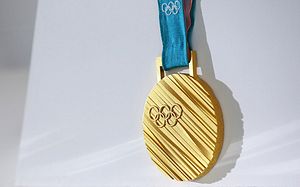On January 1, in his 2018 New Year speech, North Korean Supreme leader Kim Jong-un offered a rare olive branch to South Korea, showing willingness to participate in the upcoming PyeongChang Winter Olympics. In response, South Korean President Moon Jae-in immediately welcomed Kim’s offer and started to make plans for holding talks with North Korea ahead of the Olympics. While many observers focused most of their attention on Kim’s threatening message about the “nuclear button” on the desk of his office, the PyeongChang Winter Olympics have to potential to be a breakthrough for the North Korean Crisis.
It’s worth noting that Kim’s latest goodwill gesture toward South Korea was straightforward and unconditional.
According to the Korean Central News Agency (KCNA), Kim said:
This year is a year of significance both for the north and the south of Korea as our people will celebrate the 70th birthday of the DPRK as a great auspicious event and there will be the Winter Olympic Games in the south. In order to host the great events of the nation with splendor and demonstrate the dignity and stamina of the nation, we should melt the frozen north-south relations, thus adorning this meaningful year as a year to be specially recorded in the history of the nation.
Based on his rhetoric, Kim apparently has elevated the PyeongChang Olympics to a “national” level: the glory of hosting the event not only belongs to the South but also to the North. Under the logic, hosting the Olympics with “splendor” has become a must for the whole Korean nation. This logic is particularly true for a nationalist regime that treasures national pride above all else.
In fact, the Olympic games, as well as other international sports games, have traditionally served as a political tool for the North and the South to amend ties.
It’s worth keeping in mind that at the 2000 Sydney Summer Olympics, the 2002 Busan Asian Games, and the 2004 Athens Summer Olympics, athletes from North and South Korea all marched together in the opening ceremony under the Unification Flag of Korea. The symbolic unification between the North and South during these sports games marked the high points in inter-Korea relations.
Sharing this memory, South Korea thus was able to capture the essence of Kim’s speech immediately.
On January 2, South Korea’s Moon Jae-in accepted Kim’s olive branch. Moon said that Kim’s remarks were “a response to our proposal to turn the Pyeongchang Olympic Games into an epoch-making opportunity to improve inter-Korean relations and establish peace.”
Moon also asked the Unification Ministry “to quickly come up with follow-up measures for the speedy restoration of South-North Korean dialogue and realize the North Korean delegation’s participation in the Pyeongchang Olympics.”
Cho Myoung-gyon, the head of the Unification Ministry, proposed that talks can be held on January 9. Cho also emphasized that the South delegation would meet Kim’s delegation “anytime, anywhere and that any format for the talks would be acceptable.”
In addition, China, which held the Beijing Olympics in 2008, also perfectly understands how politically significant hosting the Olympic games can be.
Thus, at the regular press conference on January 2, China’s foreign ministry spokesperson Geng Shuang said that China has noted the “positive message” and China “welcomes and supports the DPRK and the ROK in taking this opportunity to make concrete effort to improve their relations, ease tensions in the Peninsula and realize the denuclearization of the Peninsula. ”
Currently, the biggest concern is whether the United States under the Trump administration can also appreciate the rare opportunity. According to Cho Myoung-gyon, Seoul had already consulted with Washington about potential talks with North Korea and had Washington’s blessing. But it still raises a big question over whether U.S. President Donald Trump is able to refrain from lashing out at Kim on Twitter. Indeed, on January 2, Trump responded to Kim’s speech by tweeting: “Will someone from his depleted and food starved regime please inform him that I too have a Nuclear Button, but it is a much bigger & more powerful one than his, and my Button works!”

































